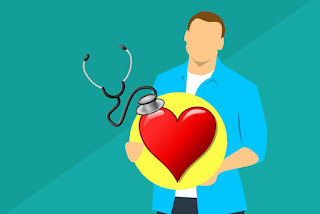Understanding High Blood
Pressure: Causes, Effects, and Natural Solutions
Millions of people around the world are silently affected
by hypertension, or high blood pressure. Even though it is common, many people
are unaware of the risks it poses. We will examine the complications of
hypertension in this comprehensive guide, including its causes, effects, and
natural remedies that can aid in properly managing this disease.
What is High Blood Pressure?
When the pressure of blood increases on the walls of the
arteries constantly, high blood pressure results. This can pose serious health
issues such as heart disease, kidney damage, and stroke. It is also known as
the "silent killer" because it usually shows no symptoms until
serious damage has been done.
Causes of High Blood Pressure:
Lifestyle: heavy blood pressure can also result from a less
active lifestyle, poor dietary choices (heavy in salt and hydrogenated fats),
excessive alcohol use, and cigarette smoking.
Genetic Predisposition: High blood pressure is
also caused by a family member's background. If any of your parents or close
relatives suffer from high blood pressure, you could be in danger.
Underlying Health Conditions: Several illnesses like
obesity, diabetes, kidney disease, and sleep apnea can raise the chance of
having high blood pressure.
Burden: Over time, high blood pressure might result from
persistent stress raising blood pressure levels.
High blood pressure's effects:
· Cardiovascular Illness: High blood pressure is
a leading source of cardiovascular disease, along with stroke.
· Kidney Damages: Prolonged hypertension
can harm the kidneys' blood vessels, resulting in kidney failure.
· Vision Loss: Hypertension can harm
the capillaries in the eyes, causing vision troubles and also loss of sight.
· Mind Feature: Uncontrolled
hypertension can result in cognitive problems plus a boosted threat of mental
deterioration.
Natural Solutions and Remedies:
Healthy Diet: It is advised to follow
a balanced meal plan full of nutritious grains, fruits, vegetables, lean meat,
and healthy, well-balanced fats. Limit your intake of salt and avoid processed
foods.
Regular exercise: Try to do at least 30
minutes of moderate-intensity exercise most days of the week. Riding, swimming
and vigorous walking are the most effective exercises that can reduce high
blood pressure.
Keep your weight under
control: Losing excess weight
can dramatically lower your blood pressure. Aim for a BMI that is within the
normal range.
Limit alcohol and quit
smoking: To lower blood pressure
and improve general health, reduce alcohol intake and quit smoking.
Herbal remedies: Some herbs and
supplements, such as hibiscus, garlic, and omega-3 fatty acids, may have a
slight hypotensive effect. However, before adding supplements to your diet,
talk to a physician.
Anxiety monitoring: Participate in leisure
workouts such as yoga exercises, tai chi, reflection, or deep breathing to
reduce the degree of anxiety.
Key Foods to Include
Berries (Blueberries,
strawberries, and raspberries), Oats, Fatty Fish (Salmon, mackerel, and
sardines), Nuts and Seeds (Almonds, walnuts, flaxseeds, and chia seeds etc.)


Comments
Post a Comment